Hello 40k fans! Chris Morgan, Chief Librarian of the Forge the Narrative Podcast, is here again with the next weekly segment of Tomes of the Librarius. Also, check the Tactics Corner for more great articles!
Just as a reminder, in this series we will explore facets of the history and legends of the Grimdark. This is meant to be an easy summary and introduction geared towards new players or people unfamiliar with the setting, but should still be an interesting read or fun refresher for those already familiar. There’s so much detail in this lore that a bare summary seems so inadequate, but for new people this should be the right portion to get a feel for the history of the universe we enjoy our games in.
This week we will be doing something different than in previous tomes articles. Since we have an overview of the major overall factions, now I thought it would be good to introduce some books that are (in my opinion) critical keystones of 40k lore. Today we will be exploring and reviewing the first in the Eisenhorn series by Dan Abnett: Xenos. We won’t be spoiling the plot, but instead explaining a little bit about the characters and story and why this is a good read for all fans of 40k.
The Man, The Myth, The Legend
Gregor Eisenhorn is a human Inquisitor of the Ordo Xenos, and at the beginning of this story he is in pursuit of a dangerous heretic preying on the slumbering denizens of a world on an irregular orbit. Trained by the honorable Inquisitor Hapshant with his friend and fellow Inquisitor, Titus Endor. Eisenhorn is a mid-level psyker, using what he calls his ‘will’ to telepathically aid his allies and destroy his enemies. His will is his power, but it is also his character – he has the willpower and determination to pursue his objective no matter the cost. Gregor Eisenhorn always gets his quarry.
Why Should You Read This Book?
There are a lot of stories in the 40k universe that revolve around the Adeptus Astartes and the epic battles that they fight against the enemies of mankind. There are often Inquisitors in these stories, and when they aren’t cackling maniacally as the ‘secret bad guy’ or interfering with the heroes’ goals with their absolute authority. In this instance, we get an inside peek into a different side of the Imperial Inquisition. Where we are used to seeing open Inquisitors commanding warhosts and demanding obedience, Eisenhorn himself uses a more subtle approach. Stealth, infiltration, deception, and subterfuge are all tools in his arsenal. His retinue is not just a bunch of muscleheads, there are scholars, pilots, investigators, and other agents who operate behind the scenes. As you would expect, there are some who don’t see his methods as truly in keeping with what they feel an Inquisitor should do. The book reads much like you would expect a detective novel to read, but considering the setting of the 40k universe you can imagine how much higher the stakes become. All of this is centered not around the demigod Astartes, but around normal and relatable humans.
Eisenhorn is an Amalathian, which is to say a moderate puritan among the scale from puritan to radical that all Inquisitors fall under. The dichotomy of the inner politics of the Inquisition and the contention that is sows within the organization is one of the more interesting and nuanced draws that the series has. Not only are Inquisitors hunting down the xenos and heretics that plague humankind, they must also balance out the many differing ideas on the appropriate methods for doing so. A great story uses conflict to drive the narrative, and while there is a lot of conflict in this novel, the reader will not get lost in the confusion.
Every part of the story the novel takes you through has an impact in the over-arching narrative, and each scene and setting is creatively and thoroughly explored. Abnett has a gift for describing unnatural phenomena in such as way as to be understood by people who . The storytelling that Dan Abnett lays out in this book is well-executed, and has merit just on its own for that reason regardless of genre. The protagonist is challenged at every turn and his morals are tested even as they are defined.
Dipping Your Toes
Hopefully that was a good sell for what is a great introduction into the Inquisition and the Imperium of man. Stay tuned for another look at the next book in the series on next week’s Tomes article!
And remember, Frontline Gaming sells gaming products at a discount, every day in their webcart!

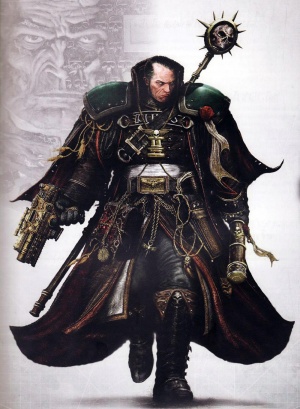
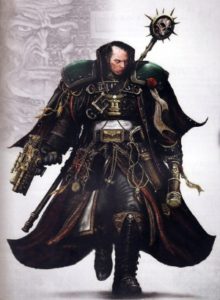
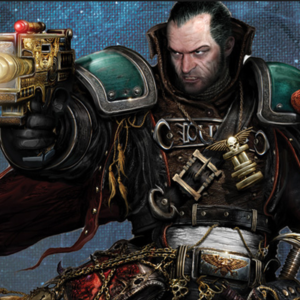

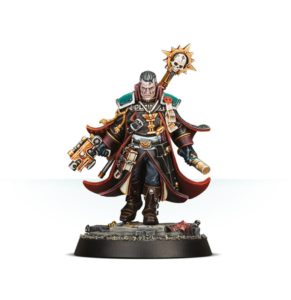
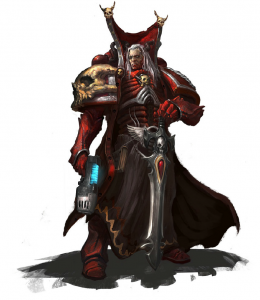


I enjoyed the article, Chris. Here are some issues to address:
“There are often Inquisitors in these stories, and when they aren’t cackling maniacally as the ‘secret bad guy’ or interfering with the heroes’ goals with their absolute authority.” – sentence fragment
The dichotomy of the inner politics of the Inquisition and the contention that is sows within the organization is one of the more interesting and nuanced draws that the series has. – check tense of verb ‘sow’
“Abnett has a gift for describing unnatural phenomena in such as way as to be understood by people who .” – sentence fragment, complete this thought (it’s a great one!)
Heya Chris, review was concise.
I feel like most people who put their foot in the door get the Eisenhorn trilogy recommended because it has seen a reprinting, but if you have read and are going to continue reviewing older books (Xenos is 17 years old) could you do some of Ian Watson’s books?
They are a bit dated, but would make a rather entertaining article. I don’t think that many people have read the inquisition war series or the original “space marine”